UTAS CNA346: Nursing Personal and Professional Development Plan 2018
VerifiedAdded on 2023/06/15
|8
|1688
|208
Report
AI Summary
This nursing assignment presents a personal and professional development plan aimed at enhancing clinical skills and knowledge for a successful transition from a graduate nurse to a registered nurse. The plan includes a SWOT analysis to identify strengths, weaknesses, opportunities, and threats, along with strategies to support resilience and professional development, such as continuous professional development (CPD) courses, effective time management, and improved relationships. The assignment also outlines a personal philosophy of nursing practice, emphasizing collaboration, respect for patient preferences, evidence-based practice, and lifelong learning. A learning plan is detailed to achieve goals like becoming a successful RN with required clinical expertise and improving computer literacy and confidence. Desklib offers a wealth of solved assignments and study resources to support nursing students in their academic and professional journeys.
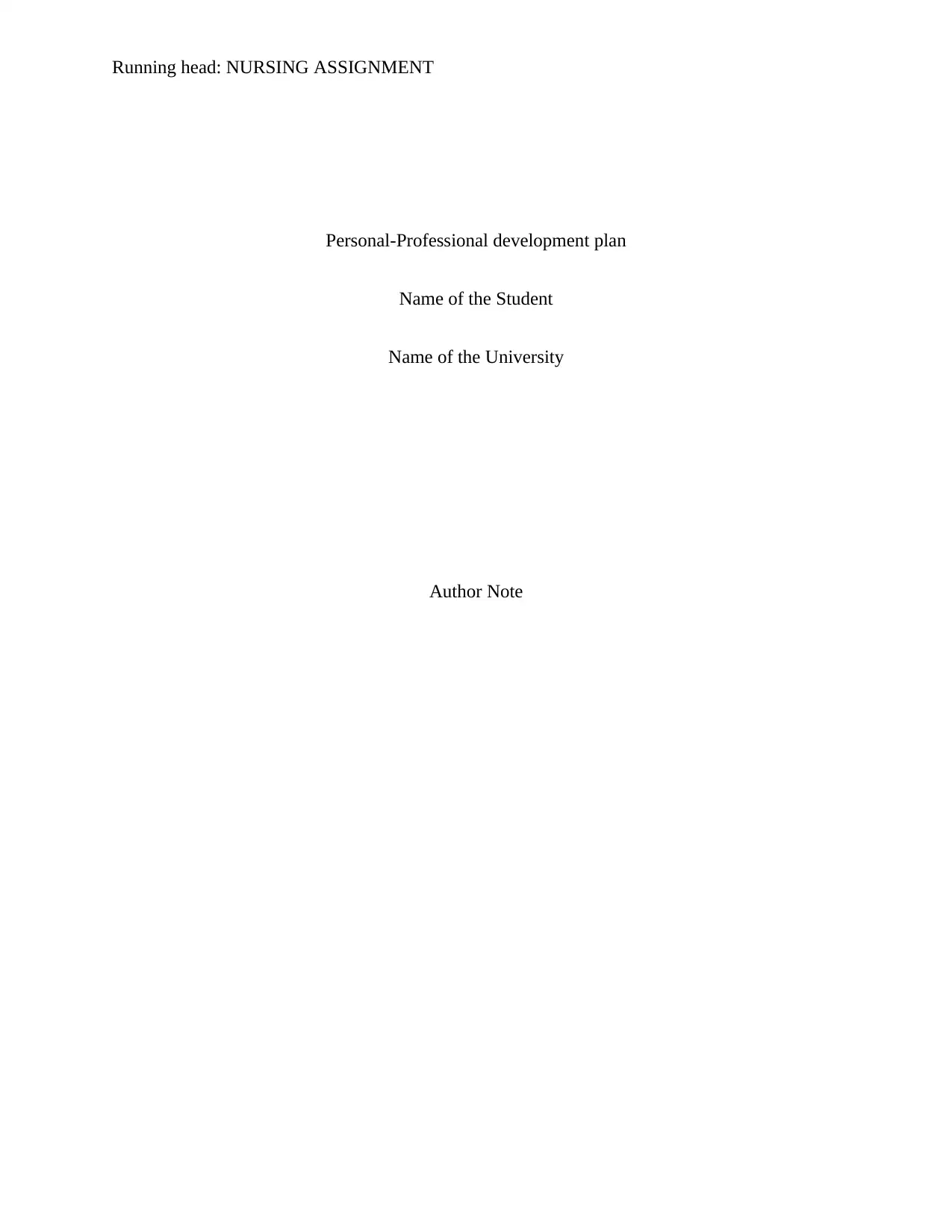
Running head: NURSING ASSIGNMENT
Personal-Professional development plan
Name of the Student
Name of the University
Author Note
Personal-Professional development plan
Name of the Student
Name of the University
Author Note
Paraphrase This Document
Need a fresh take? Get an instant paraphrase of this document with our AI Paraphraser
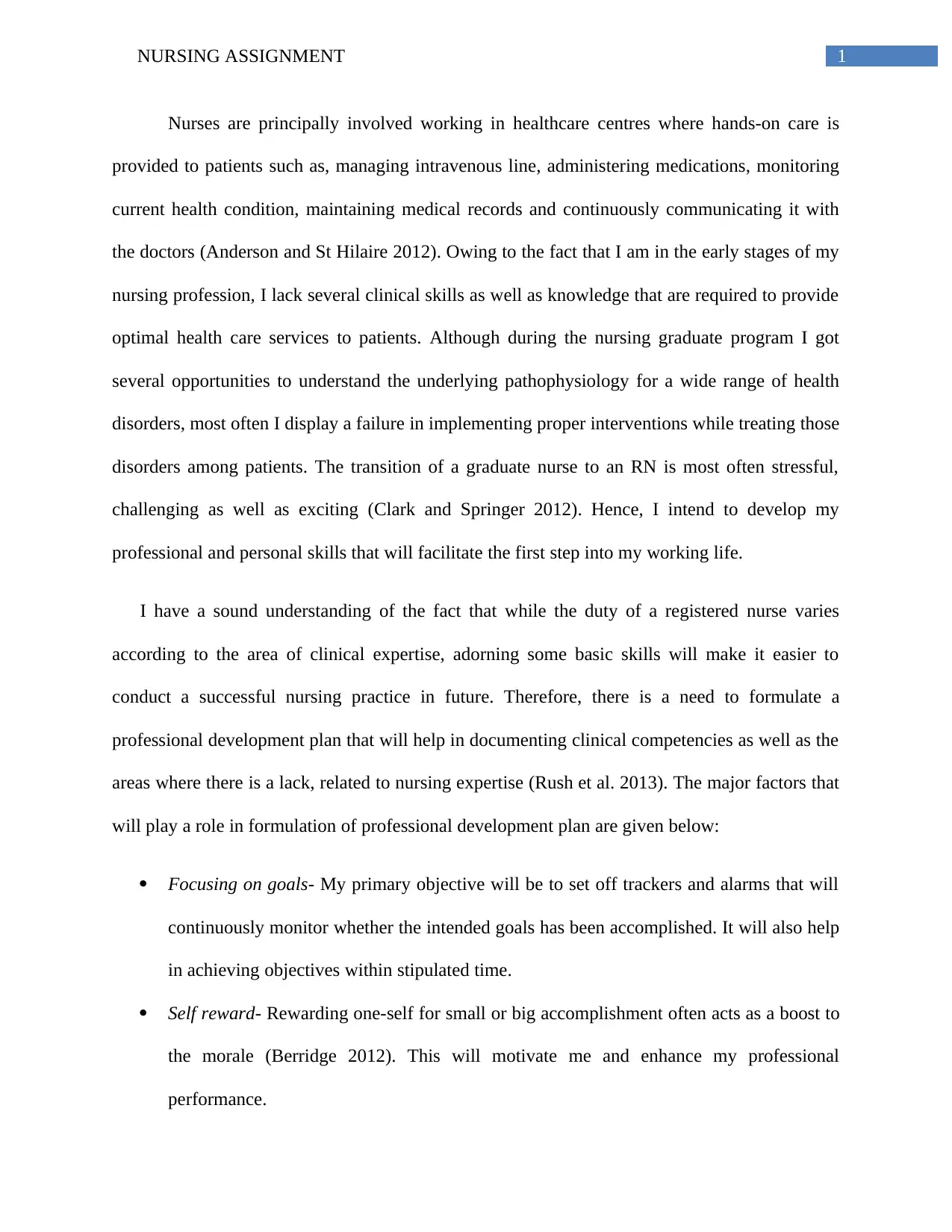
1NURSING ASSIGNMENT
Nurses are principally involved working in healthcare centres where hands-on care is
provided to patients such as, managing intravenous line, administering medications, monitoring
current health condition, maintaining medical records and continuously communicating it with
the doctors (Anderson and St Hilaire 2012). Owing to the fact that I am in the early stages of my
nursing profession, I lack several clinical skills as well as knowledge that are required to provide
optimal health care services to patients. Although during the nursing graduate program I got
several opportunities to understand the underlying pathophysiology for a wide range of health
disorders, most often I display a failure in implementing proper interventions while treating those
disorders among patients. The transition of a graduate nurse to an RN is most often stressful,
challenging as well as exciting (Clark and Springer 2012). Hence, I intend to develop my
professional and personal skills that will facilitate the first step into my working life.
I have a sound understanding of the fact that while the duty of a registered nurse varies
according to the area of clinical expertise, adorning some basic skills will make it easier to
conduct a successful nursing practice in future. Therefore, there is a need to formulate a
professional development plan that will help in documenting clinical competencies as well as the
areas where there is a lack, related to nursing expertise (Rush et al. 2013). The major factors that
will play a role in formulation of professional development plan are given below:
Focusing on goals- My primary objective will be to set off trackers and alarms that will
continuously monitor whether the intended goals has been accomplished. It will also help
in achieving objectives within stipulated time.
Self reward- Rewarding one-self for small or big accomplishment often acts as a boost to
the morale (Berridge 2012). This will motivate me and enhance my professional
performance.
Nurses are principally involved working in healthcare centres where hands-on care is
provided to patients such as, managing intravenous line, administering medications, monitoring
current health condition, maintaining medical records and continuously communicating it with
the doctors (Anderson and St Hilaire 2012). Owing to the fact that I am in the early stages of my
nursing profession, I lack several clinical skills as well as knowledge that are required to provide
optimal health care services to patients. Although during the nursing graduate program I got
several opportunities to understand the underlying pathophysiology for a wide range of health
disorders, most often I display a failure in implementing proper interventions while treating those
disorders among patients. The transition of a graduate nurse to an RN is most often stressful,
challenging as well as exciting (Clark and Springer 2012). Hence, I intend to develop my
professional and personal skills that will facilitate the first step into my working life.
I have a sound understanding of the fact that while the duty of a registered nurse varies
according to the area of clinical expertise, adorning some basic skills will make it easier to
conduct a successful nursing practice in future. Therefore, there is a need to formulate a
professional development plan that will help in documenting clinical competencies as well as the
areas where there is a lack, related to nursing expertise (Rush et al. 2013). The major factors that
will play a role in formulation of professional development plan are given below:
Focusing on goals- My primary objective will be to set off trackers and alarms that will
continuously monitor whether the intended goals has been accomplished. It will also help
in achieving objectives within stipulated time.
Self reward- Rewarding one-self for small or big accomplishment often acts as a boost to
the morale (Berridge 2012). This will motivate me and enhance my professional
performance.
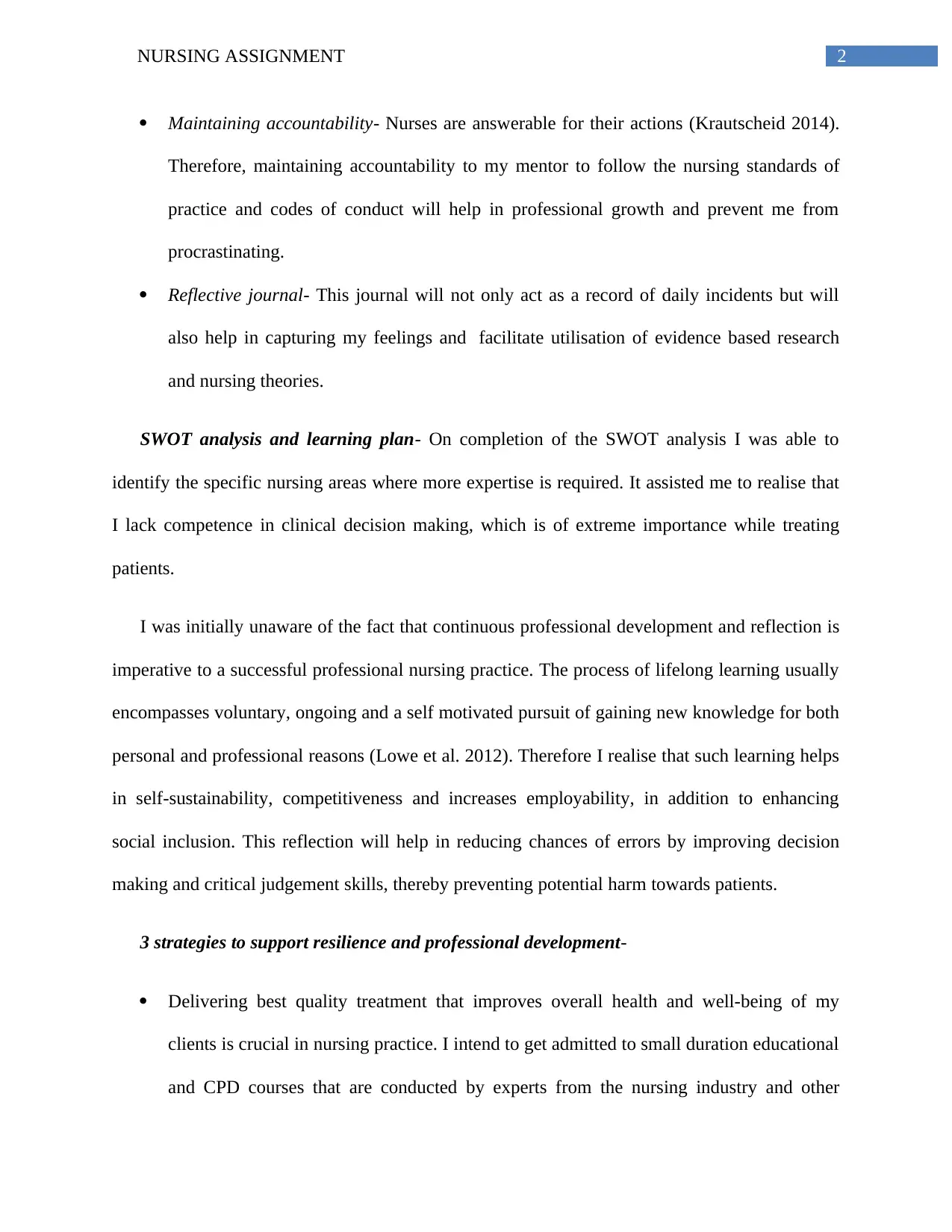
2NURSING ASSIGNMENT
Maintaining accountability- Nurses are answerable for their actions (Krautscheid 2014).
Therefore, maintaining accountability to my mentor to follow the nursing standards of
practice and codes of conduct will help in professional growth and prevent me from
procrastinating.
Reflective journal- This journal will not only act as a record of daily incidents but will
also help in capturing my feelings and facilitate utilisation of evidence based research
and nursing theories.
SWOT analysis and learning plan- On completion of the SWOT analysis I was able to
identify the specific nursing areas where more expertise is required. It assisted me to realise that
I lack competence in clinical decision making, which is of extreme importance while treating
patients.
I was initially unaware of the fact that continuous professional development and reflection is
imperative to a successful professional nursing practice. The process of lifelong learning usually
encompasses voluntary, ongoing and a self motivated pursuit of gaining new knowledge for both
personal and professional reasons (Lowe et al. 2012). Therefore I realise that such learning helps
in self-sustainability, competitiveness and increases employability, in addition to enhancing
social inclusion. This reflection will help in reducing chances of errors by improving decision
making and critical judgement skills, thereby preventing potential harm towards patients.
3 strategies to support resilience and professional development-
Delivering best quality treatment that improves overall health and well-being of my
clients is crucial in nursing practice. I intend to get admitted to small duration educational
and CPD courses that are conducted by experts from the nursing industry and other
Maintaining accountability- Nurses are answerable for their actions (Krautscheid 2014).
Therefore, maintaining accountability to my mentor to follow the nursing standards of
practice and codes of conduct will help in professional growth and prevent me from
procrastinating.
Reflective journal- This journal will not only act as a record of daily incidents but will
also help in capturing my feelings and facilitate utilisation of evidence based research
and nursing theories.
SWOT analysis and learning plan- On completion of the SWOT analysis I was able to
identify the specific nursing areas where more expertise is required. It assisted me to realise that
I lack competence in clinical decision making, which is of extreme importance while treating
patients.
I was initially unaware of the fact that continuous professional development and reflection is
imperative to a successful professional nursing practice. The process of lifelong learning usually
encompasses voluntary, ongoing and a self motivated pursuit of gaining new knowledge for both
personal and professional reasons (Lowe et al. 2012). Therefore I realise that such learning helps
in self-sustainability, competitiveness and increases employability, in addition to enhancing
social inclusion. This reflection will help in reducing chances of errors by improving decision
making and critical judgement skills, thereby preventing potential harm towards patients.
3 strategies to support resilience and professional development-
Delivering best quality treatment that improves overall health and well-being of my
clients is crucial in nursing practice. I intend to get admitted to small duration educational
and CPD courses that are conducted by experts from the nursing industry and other
⊘ This is a preview!⊘
Do you want full access?
Subscribe today to unlock all pages.

Trusted by 1+ million students worldwide
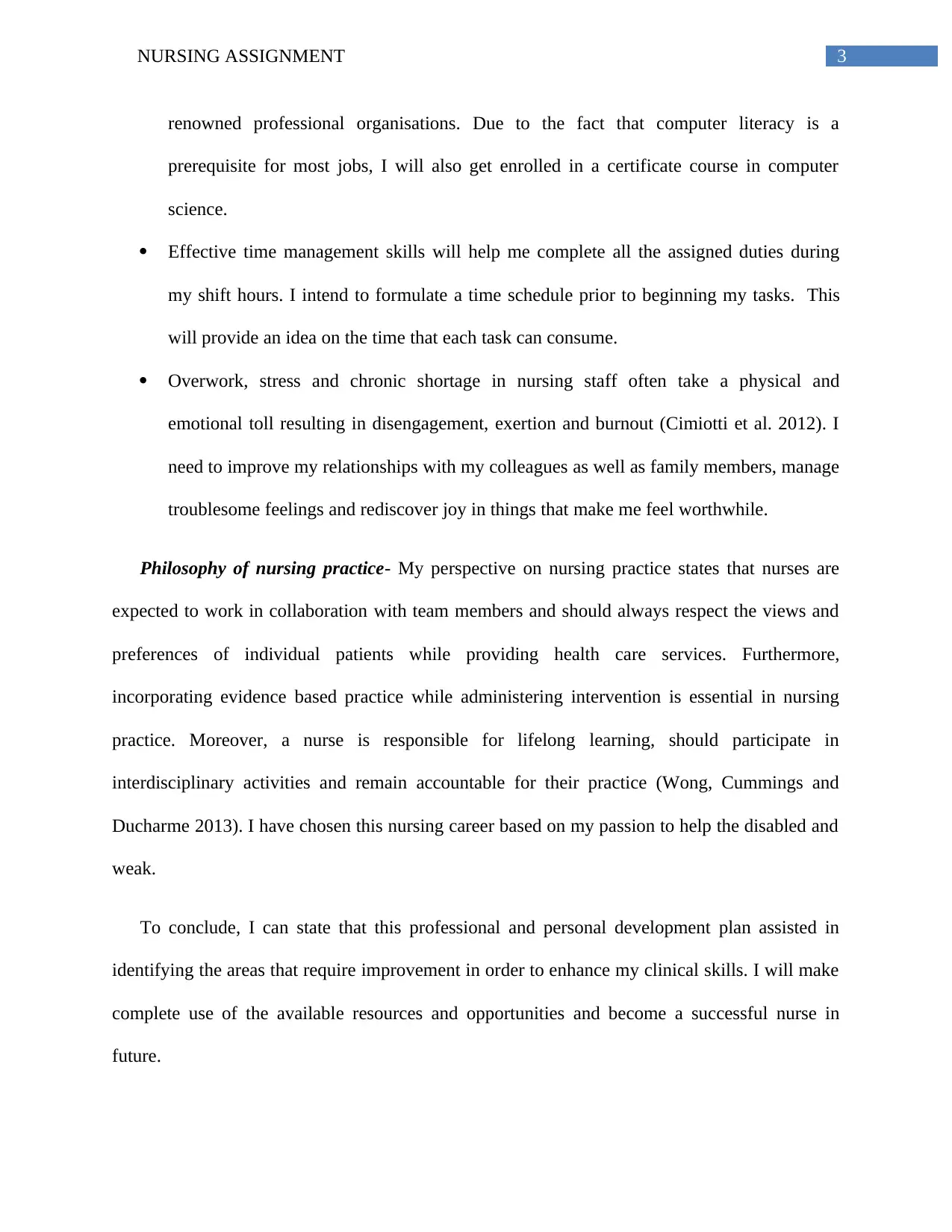
3NURSING ASSIGNMENT
renowned professional organisations. Due to the fact that computer literacy is a
prerequisite for most jobs, I will also get enrolled in a certificate course in computer
science.
Effective time management skills will help me complete all the assigned duties during
my shift hours. I intend to formulate a time schedule prior to beginning my tasks. This
will provide an idea on the time that each task can consume.
Overwork, stress and chronic shortage in nursing staff often take a physical and
emotional toll resulting in disengagement, exertion and burnout (Cimiotti et al. 2012). I
need to improve my relationships with my colleagues as well as family members, manage
troublesome feelings and rediscover joy in things that make me feel worthwhile.
Philosophy of nursing practice- My perspective on nursing practice states that nurses are
expected to work in collaboration with team members and should always respect the views and
preferences of individual patients while providing health care services. Furthermore,
incorporating evidence based practice while administering intervention is essential in nursing
practice. Moreover, a nurse is responsible for lifelong learning, should participate in
interdisciplinary activities and remain accountable for their practice (Wong, Cummings and
Ducharme 2013). I have chosen this nursing career based on my passion to help the disabled and
weak.
To conclude, I can state that this professional and personal development plan assisted in
identifying the areas that require improvement in order to enhance my clinical skills. I will make
complete use of the available resources and opportunities and become a successful nurse in
future.
renowned professional organisations. Due to the fact that computer literacy is a
prerequisite for most jobs, I will also get enrolled in a certificate course in computer
science.
Effective time management skills will help me complete all the assigned duties during
my shift hours. I intend to formulate a time schedule prior to beginning my tasks. This
will provide an idea on the time that each task can consume.
Overwork, stress and chronic shortage in nursing staff often take a physical and
emotional toll resulting in disengagement, exertion and burnout (Cimiotti et al. 2012). I
need to improve my relationships with my colleagues as well as family members, manage
troublesome feelings and rediscover joy in things that make me feel worthwhile.
Philosophy of nursing practice- My perspective on nursing practice states that nurses are
expected to work in collaboration with team members and should always respect the views and
preferences of individual patients while providing health care services. Furthermore,
incorporating evidence based practice while administering intervention is essential in nursing
practice. Moreover, a nurse is responsible for lifelong learning, should participate in
interdisciplinary activities and remain accountable for their practice (Wong, Cummings and
Ducharme 2013). I have chosen this nursing career based on my passion to help the disabled and
weak.
To conclude, I can state that this professional and personal development plan assisted in
identifying the areas that require improvement in order to enhance my clinical skills. I will make
complete use of the available resources and opportunities and become a successful nurse in
future.
Paraphrase This Document
Need a fresh take? Get an instant paraphrase of this document with our AI Paraphraser
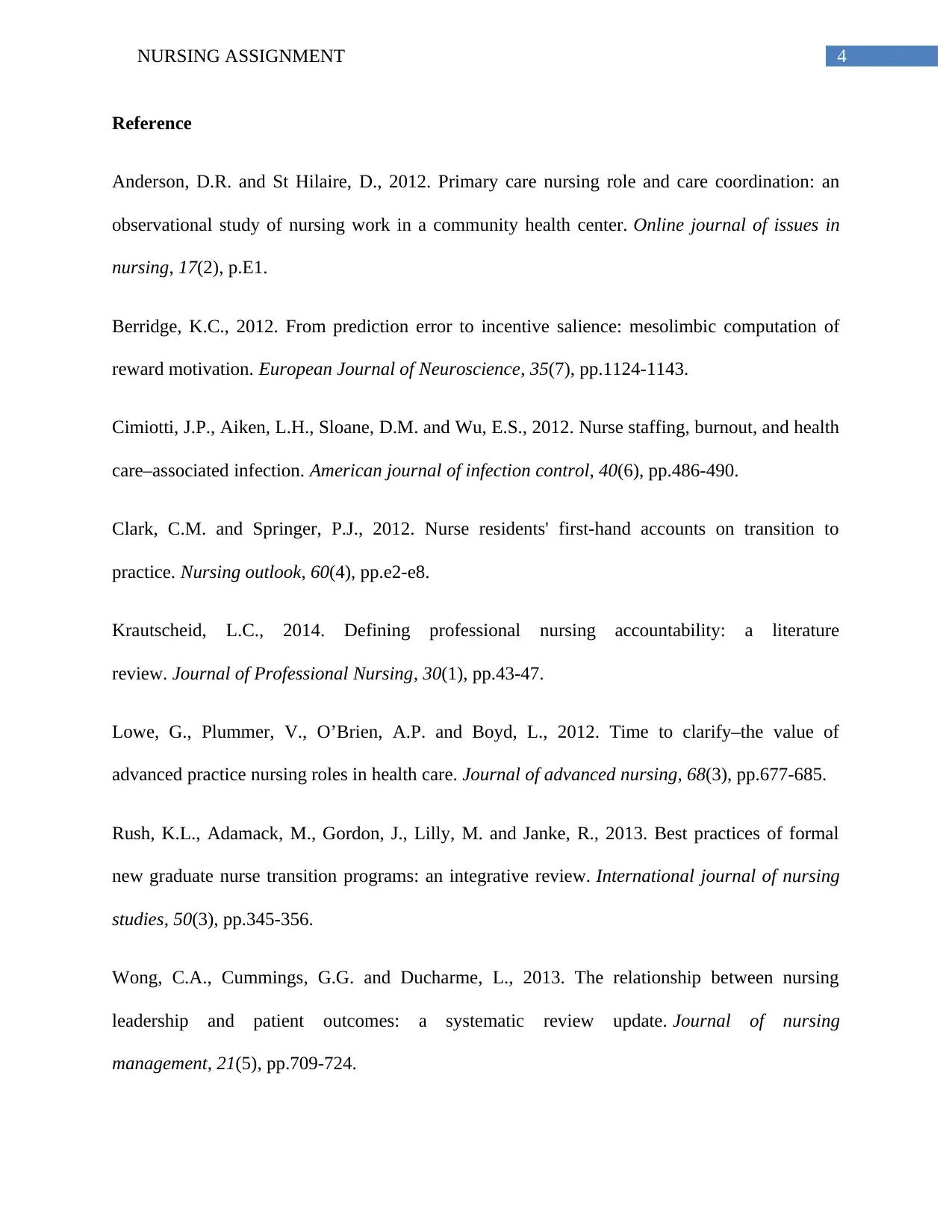
4NURSING ASSIGNMENT
Reference
Anderson, D.R. and St Hilaire, D., 2012. Primary care nursing role and care coordination: an
observational study of nursing work in a community health center. Online journal of issues in
nursing, 17(2), p.E1.
Berridge, K.C., 2012. From prediction error to incentive salience: mesolimbic computation of
reward motivation. European Journal of Neuroscience, 35(7), pp.1124-1143.
Cimiotti, J.P., Aiken, L.H., Sloane, D.M. and Wu, E.S., 2012. Nurse staffing, burnout, and health
care–associated infection. American journal of infection control, 40(6), pp.486-490.
Clark, C.M. and Springer, P.J., 2012. Nurse residents' first-hand accounts on transition to
practice. Nursing outlook, 60(4), pp.e2-e8.
Krautscheid, L.C., 2014. Defining professional nursing accountability: a literature
review. Journal of Professional Nursing, 30(1), pp.43-47.
Lowe, G., Plummer, V., O’Brien, A.P. and Boyd, L., 2012. Time to clarify–the value of
advanced practice nursing roles in health care. Journal of advanced nursing, 68(3), pp.677-685.
Rush, K.L., Adamack, M., Gordon, J., Lilly, M. and Janke, R., 2013. Best practices of formal
new graduate nurse transition programs: an integrative review. International journal of nursing
studies, 50(3), pp.345-356.
Wong, C.A., Cummings, G.G. and Ducharme, L., 2013. The relationship between nursing
leadership and patient outcomes: a systematic review update. Journal of nursing
management, 21(5), pp.709-724.
Reference
Anderson, D.R. and St Hilaire, D., 2012. Primary care nursing role and care coordination: an
observational study of nursing work in a community health center. Online journal of issues in
nursing, 17(2), p.E1.
Berridge, K.C., 2012. From prediction error to incentive salience: mesolimbic computation of
reward motivation. European Journal of Neuroscience, 35(7), pp.1124-1143.
Cimiotti, J.P., Aiken, L.H., Sloane, D.M. and Wu, E.S., 2012. Nurse staffing, burnout, and health
care–associated infection. American journal of infection control, 40(6), pp.486-490.
Clark, C.M. and Springer, P.J., 2012. Nurse residents' first-hand accounts on transition to
practice. Nursing outlook, 60(4), pp.e2-e8.
Krautscheid, L.C., 2014. Defining professional nursing accountability: a literature
review. Journal of Professional Nursing, 30(1), pp.43-47.
Lowe, G., Plummer, V., O’Brien, A.P. and Boyd, L., 2012. Time to clarify–the value of
advanced practice nursing roles in health care. Journal of advanced nursing, 68(3), pp.677-685.
Rush, K.L., Adamack, M., Gordon, J., Lilly, M. and Janke, R., 2013. Best practices of formal
new graduate nurse transition programs: an integrative review. International journal of nursing
studies, 50(3), pp.345-356.
Wong, C.A., Cummings, G.G. and Ducharme, L., 2013. The relationship between nursing
leadership and patient outcomes: a systematic review update. Journal of nursing
management, 21(5), pp.709-724.
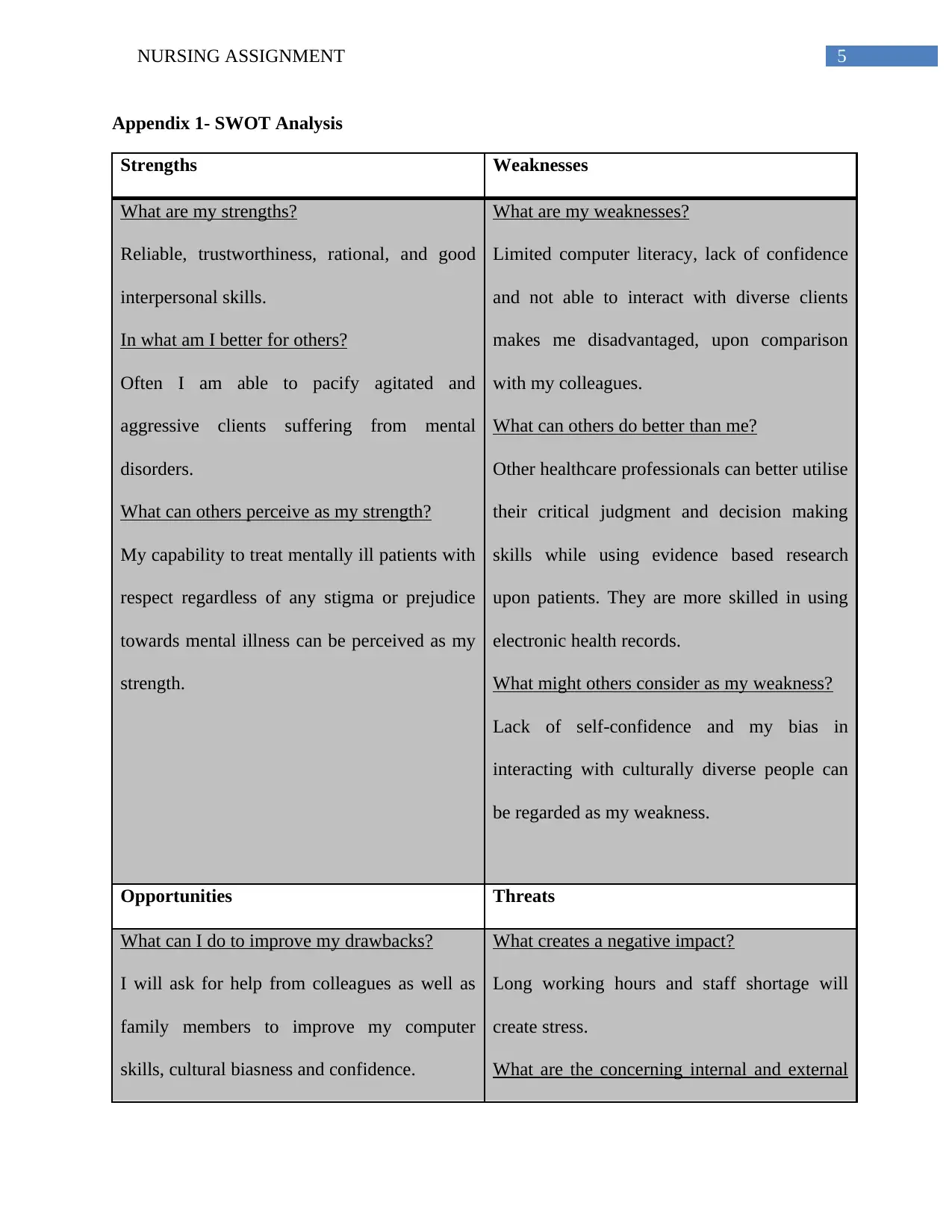
5NURSING ASSIGNMENT
Appendix 1- SWOT Analysis
Strengths Weaknesses
What are my strengths?
Reliable, trustworthiness, rational, and good
interpersonal skills.
In what am I better for others?
Often I am able to pacify agitated and
aggressive clients suffering from mental
disorders.
What can others perceive as my strength?
My capability to treat mentally ill patients with
respect regardless of any stigma or prejudice
towards mental illness can be perceived as my
strength.
What are my weaknesses?
Limited computer literacy, lack of confidence
and not able to interact with diverse clients
makes me disadvantaged, upon comparison
with my colleagues.
What can others do better than me?
Other healthcare professionals can better utilise
their critical judgment and decision making
skills while using evidence based research
upon patients. They are more skilled in using
electronic health records.
What might others consider as my weakness?
Lack of self-confidence and my bias in
interacting with culturally diverse people can
be regarded as my weakness.
Opportunities Threats
What can I do to improve my drawbacks?
I will ask for help from colleagues as well as
family members to improve my computer
skills, cultural biasness and confidence.
What creates a negative impact?
Long working hours and staff shortage will
create stress.
What are the concerning internal and external
Appendix 1- SWOT Analysis
Strengths Weaknesses
What are my strengths?
Reliable, trustworthiness, rational, and good
interpersonal skills.
In what am I better for others?
Often I am able to pacify agitated and
aggressive clients suffering from mental
disorders.
What can others perceive as my strength?
My capability to treat mentally ill patients with
respect regardless of any stigma or prejudice
towards mental illness can be perceived as my
strength.
What are my weaknesses?
Limited computer literacy, lack of confidence
and not able to interact with diverse clients
makes me disadvantaged, upon comparison
with my colleagues.
What can others do better than me?
Other healthcare professionals can better utilise
their critical judgment and decision making
skills while using evidence based research
upon patients. They are more skilled in using
electronic health records.
What might others consider as my weakness?
Lack of self-confidence and my bias in
interacting with culturally diverse people can
be regarded as my weakness.
Opportunities Threats
What can I do to improve my drawbacks?
I will ask for help from colleagues as well as
family members to improve my computer
skills, cultural biasness and confidence.
What creates a negative impact?
Long working hours and staff shortage will
create stress.
What are the concerning internal and external
⊘ This is a preview!⊘
Do you want full access?
Subscribe today to unlock all pages.

Trusted by 1+ million students worldwide
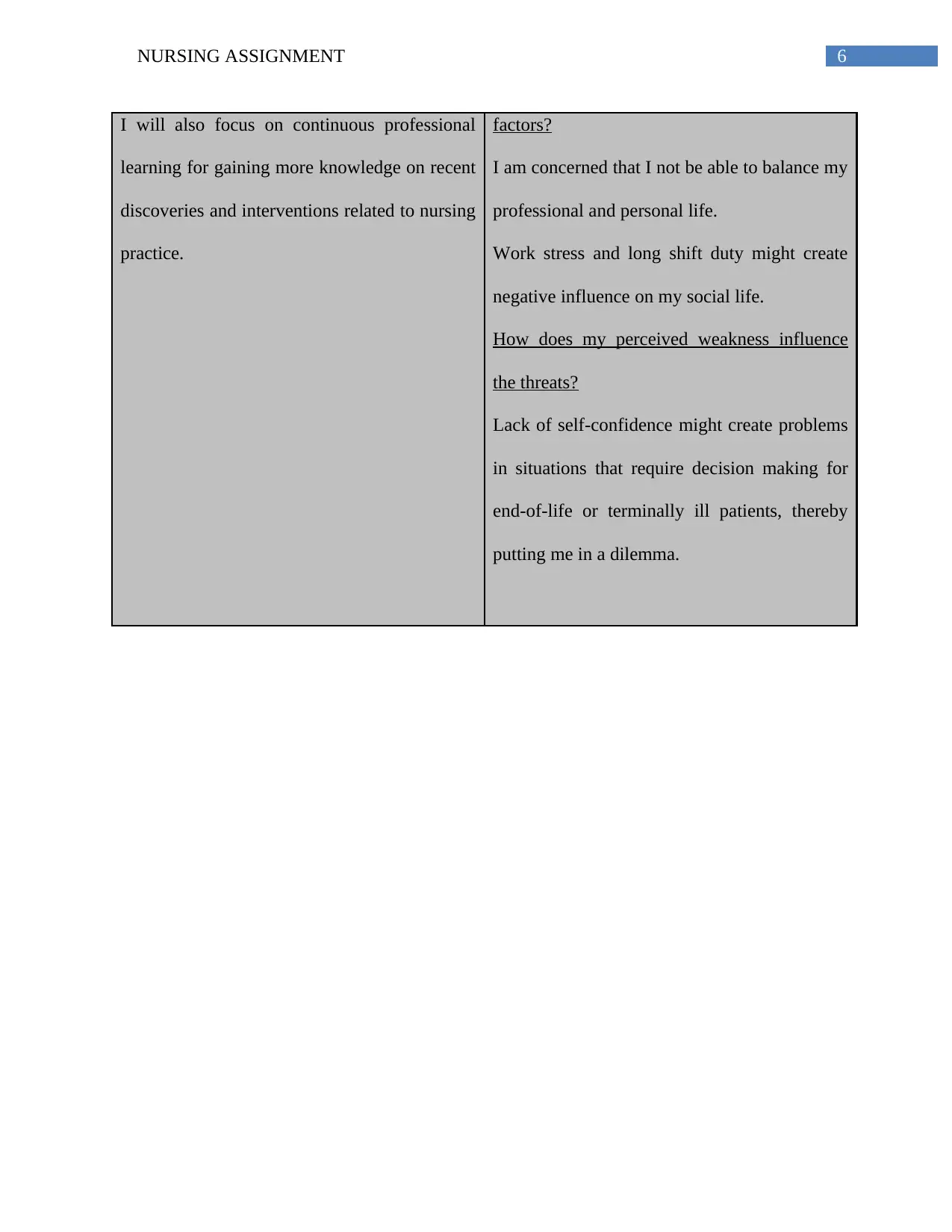
6NURSING ASSIGNMENT
I will also focus on continuous professional
learning for gaining more knowledge on recent
discoveries and interventions related to nursing
practice.
factors?
I am concerned that I not be able to balance my
professional and personal life.
Work stress and long shift duty might create
negative influence on my social life.
How does my perceived weakness influence
the threats?
Lack of self-confidence might create problems
in situations that require decision making for
end-of-life or terminally ill patients, thereby
putting me in a dilemma.
I will also focus on continuous professional
learning for gaining more knowledge on recent
discoveries and interventions related to nursing
practice.
factors?
I am concerned that I not be able to balance my
professional and personal life.
Work stress and long shift duty might create
negative influence on my social life.
How does my perceived weakness influence
the threats?
Lack of self-confidence might create problems
in situations that require decision making for
end-of-life or terminally ill patients, thereby
putting me in a dilemma.
Paraphrase This Document
Need a fresh take? Get an instant paraphrase of this document with our AI Paraphraser
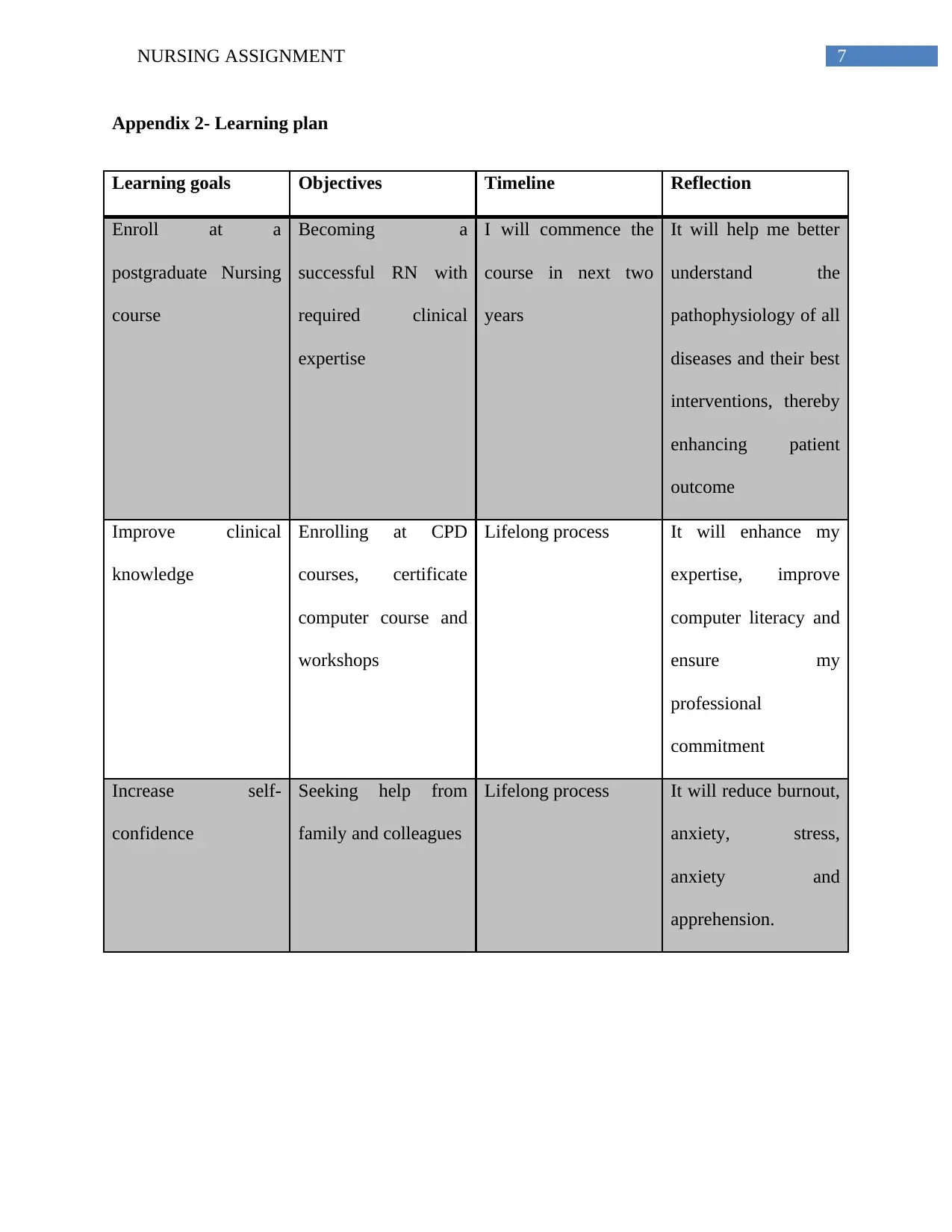
7NURSING ASSIGNMENT
Appendix 2- Learning plan
Learning goals Objectives Timeline Reflection
Enroll at a
postgraduate Nursing
course
Becoming a
successful RN with
required clinical
expertise
I will commence the
course in next two
years
It will help me better
understand the
pathophysiology of all
diseases and their best
interventions, thereby
enhancing patient
outcome
Improve clinical
knowledge
Enrolling at CPD
courses, certificate
computer course and
workshops
Lifelong process It will enhance my
expertise, improve
computer literacy and
ensure my
professional
commitment
Increase self-
confidence
Seeking help from
family and colleagues
Lifelong process It will reduce burnout,
anxiety, stress,
anxiety and
apprehension.
Appendix 2- Learning plan
Learning goals Objectives Timeline Reflection
Enroll at a
postgraduate Nursing
course
Becoming a
successful RN with
required clinical
expertise
I will commence the
course in next two
years
It will help me better
understand the
pathophysiology of all
diseases and their best
interventions, thereby
enhancing patient
outcome
Improve clinical
knowledge
Enrolling at CPD
courses, certificate
computer course and
workshops
Lifelong process It will enhance my
expertise, improve
computer literacy and
ensure my
professional
commitment
Increase self-
confidence
Seeking help from
family and colleagues
Lifelong process It will reduce burnout,
anxiety, stress,
anxiety and
apprehension.
1 out of 8
Related Documents
Your All-in-One AI-Powered Toolkit for Academic Success.
+13062052269
info@desklib.com
Available 24*7 on WhatsApp / Email
![[object Object]](/_next/static/media/star-bottom.7253800d.svg)
Unlock your academic potential
Copyright © 2020–2026 A2Z Services. All Rights Reserved. Developed and managed by ZUCOL.





